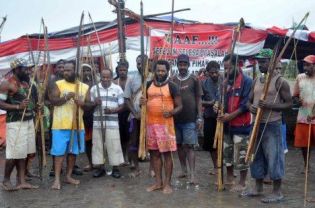 Papuan Amungme tribesmen armed with traditional bows and arrows stand guard before the strikers' road blockade at the US Freeport-McMoran gold and copper mine on Friday. (EPA Photo)
Papuan Amungme tribesmen armed with traditional bows and arrows stand guard before the strikers' road blockade at the US Freeport-McMoran gold and copper mine on Friday. (EPA Photo)Dorus Wakum from Kampak Papua said locals were upset that the government routinely left them out of business deals in the region even though they were forced to bear the brunt of the consequences of these deals.
“In addition, there is a large security presence to suppress us,” he said in Jakarta.
The uncontrolled exploitation of natural resources by large firms adds to the misery of ethnic Papuans, human rights activist Usman Hamid said.
“The seas around Raja Ampat are being destroyed,” he said. “The coastlines are damaged because of mining activity.
“At the same time, state violence against locals who protest the seizure of communal land is not new.
“The people resist because the land is being taken to benefit mining and plantation companies.”
Sinnal Blegur from the Papua NGO cooperation forum said that apart from Freeport, there were several firms ready to begin operations in Papua in situations that could foster conflict. The firms include BP in Bintuni and the Merauke Integrated Food and Energy Estate, which is believed to be run by the Medco and Bakrie conglomerates as well as the Sinar Mas conglomerate, which has a long history of operating in the province.
Hamid added that the central government had allocated 14 million hectares of Papua’s total land area of 40 million hectares to mining, plantation and energy firms.
Oktavianus Pogau from the West Papua National Committee (KNPB) said the central government should find a real solution to the situation and not just view an increase in Papua’s special autonomy fund as a cure.
“The special autonomy fund has been increased for 2012,” Oktavianus said. “The government feels Papuans are protesting because we do not get enough money. That is wrong. Increasing the funding will not solve the problem.”
Oktavianus added that the funds ended up in the pockets of only 1 percent of Papuans. “The solution would be a dialogue and an immediate end to the injustice,” he said. “Continued state violence and discrimination can only pose a new threat to the country.”
Oktavianus also highlighted the crippled role of the Papua People’s Assembly. “If a member of the assembly addresses Papuan rights, they are instantly branded separatists,” he said. “They will not be issued security clearances by the Home Affairs Ministry and the National Intelligence Agency [BIN].”
The NGOs called on the government to set up a team to investigate possible links between the issuance of business licenses in Papua and protests and state violence.
Usman said that on his recent visit to the province, there was no real threat posed by protestors to Indonesian sovereignty, an excuse security officials often use to carry out violence against locals.
“The real reason for the heavy security presence in Papua is to protect assets,” he said.
